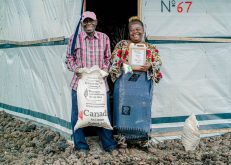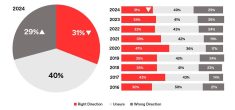Somalia is entering its worst drought in five years and aid agencies are unable to feed the majority of people in need, a senior United Nations humanitarian official said Jan. 28.
Al Shabaab rebels, who profess loyalty to al-Qaida, have refused to allow food aid to be distributed in southern and central Somalia, which they control.
“It looks as if we are now going into something that last happened five years ago, which is an acute drought cycle,” Mark Bowden, the UN humanitarian co-ordinator for Somalia, said in an interview with Reuters.
Read Also

Mazergroup’s Bob Mazer dies
Mazergroup’s Bob Mazer, who helped grow his family’s company into a string of farm equipment dealerships and the main dealer for New Holland machinery in Saskatchewan and Manitoba, died July 6 from cancer.
“Clearly the issue of food distribution is going to become more and more pressing.”
The number of Somalis in need of aid has increased by 20 per cent in the last six months to 2.4 million, 32 per cent of the population of 7.5 million, according to the Food and Agriculture Organization’s (FAO) unit report on Somalia.
Bowden said half the population might require aid as the drought intensifies. He said the rebels were unwilling to negotiate with the UN because they did not believe food aid was necessary.
“There is a sort of sense from some of the armed groups that food assistance creates dependency and is not good for the population,” Bowden said.
Al Shabaab officials contacted by Reuters declined comment.
Acute malnutrition among children has risen to 21 per cent from 15 per cent in the last six months. Three quarters of these children are in the rebel-controlled south.
Sorghum and maize prices have increased by 75 to 80 per cent following the failure of the October to December rains.
“We have seen a complete crop failure,” said Grainne Moloney, chief technical adviser at FAO’s Food Security and Nutrition Analysis Unit.
Many people, particularly some 400,000 displaced people living in the Afgooye corridor 25 km (16 miles) outside the capital Mogadishu, cannot afford food because they have no work.
Some are returning to conflict-stricken Mogadishu to earn money. Increasing numbers will be forced to migrate in search of work as the drought worsens, aid officials said.


















